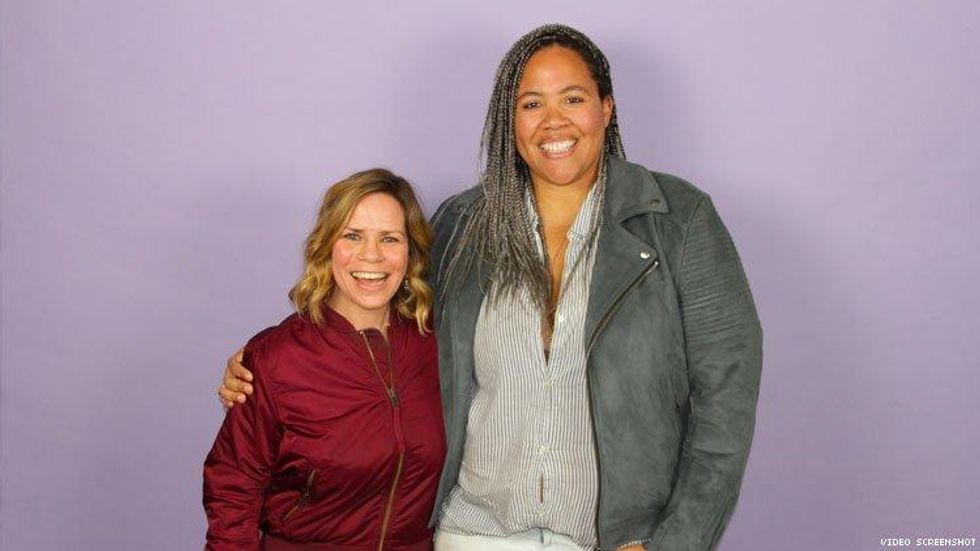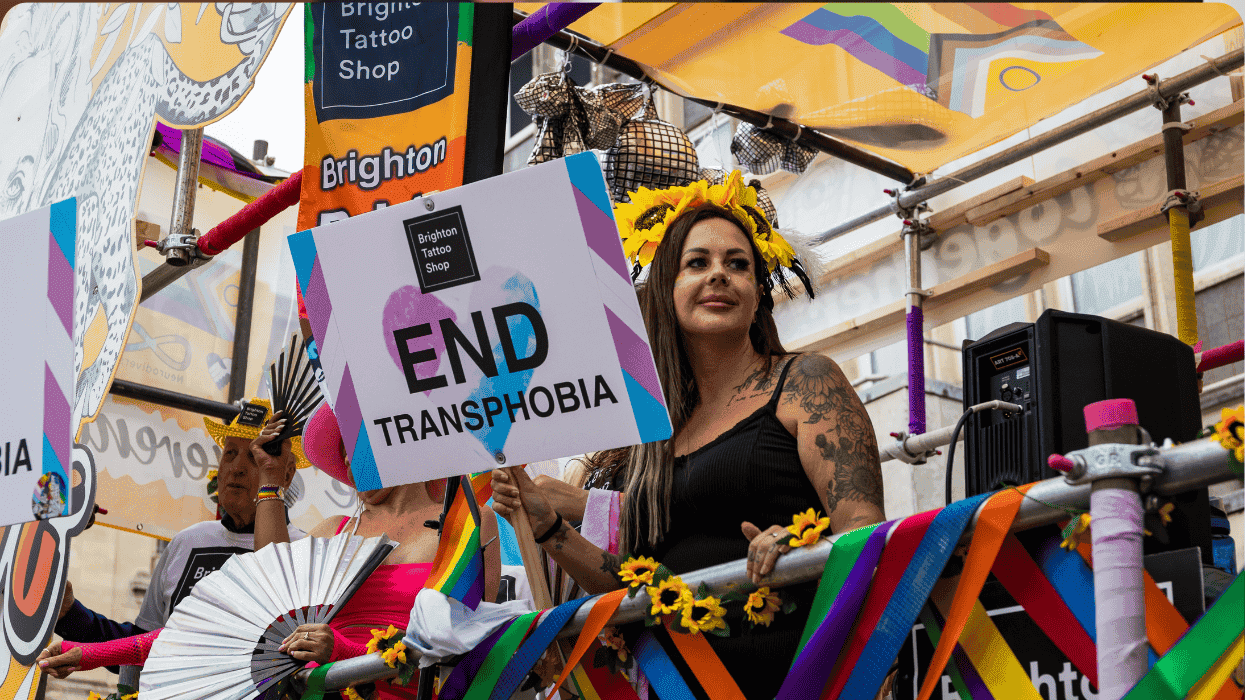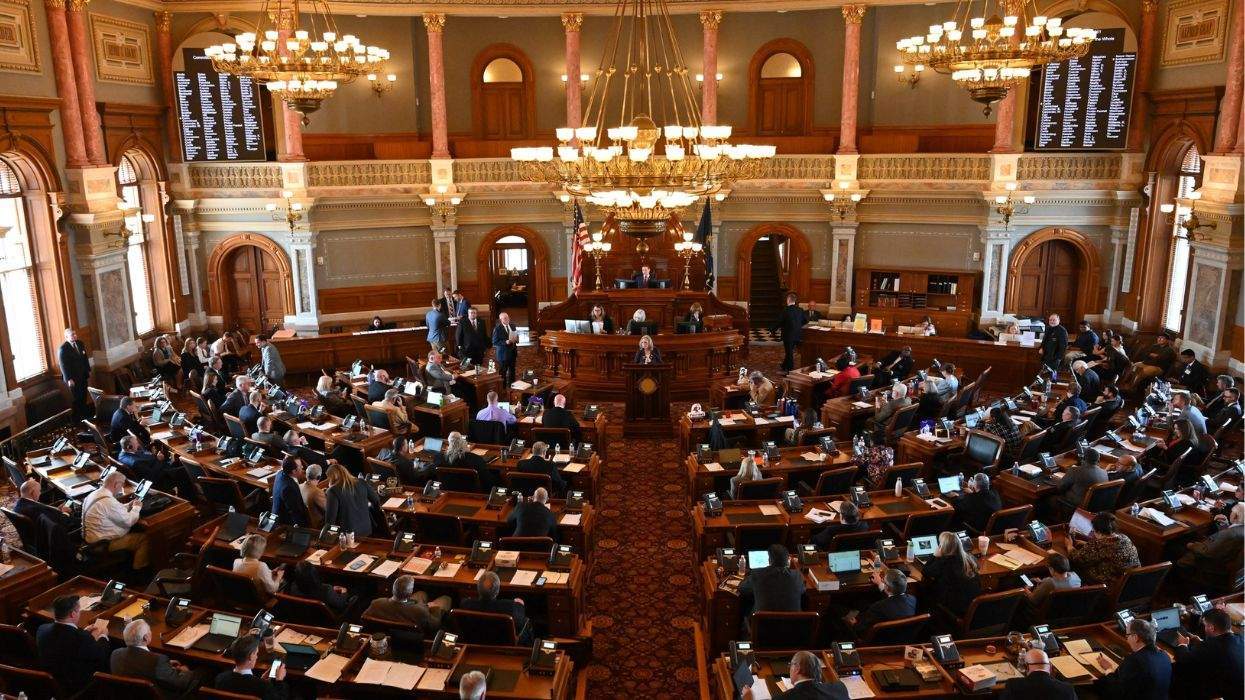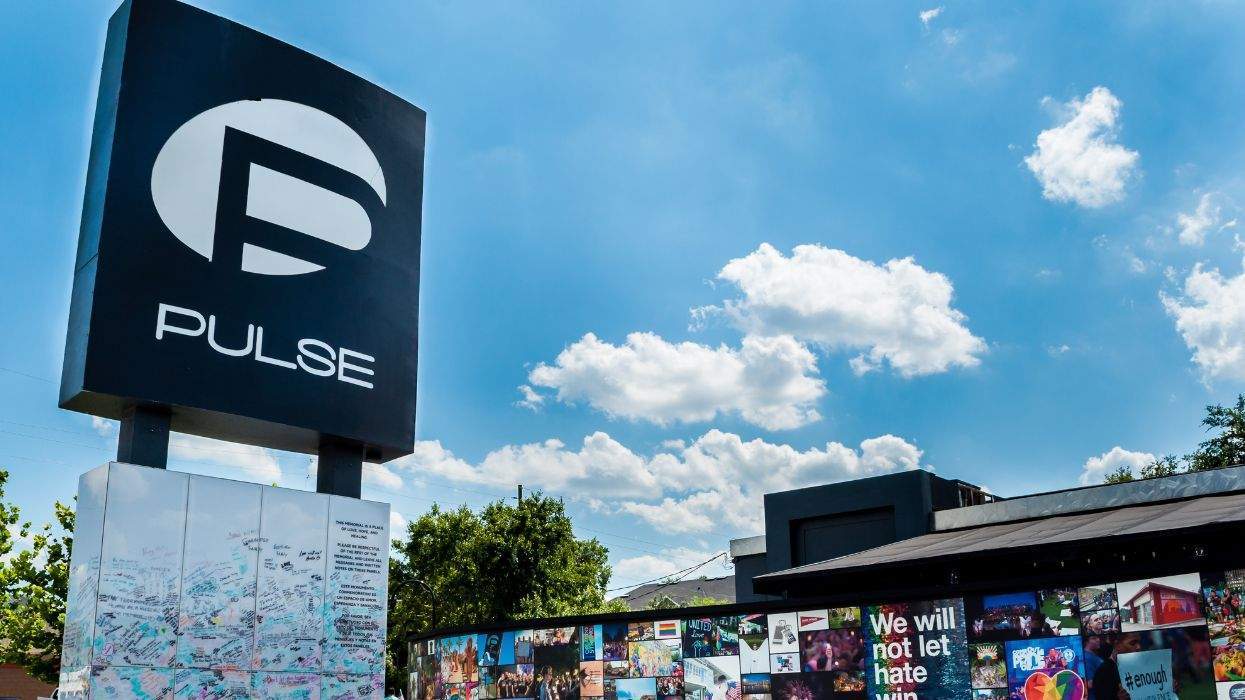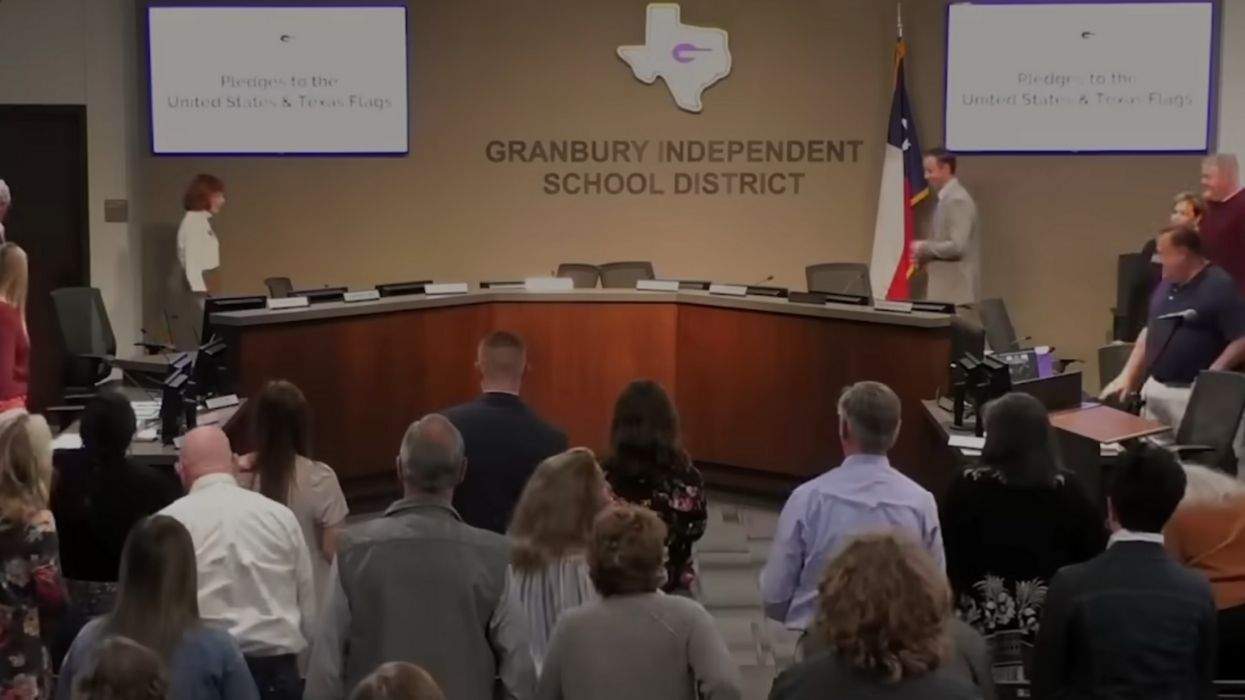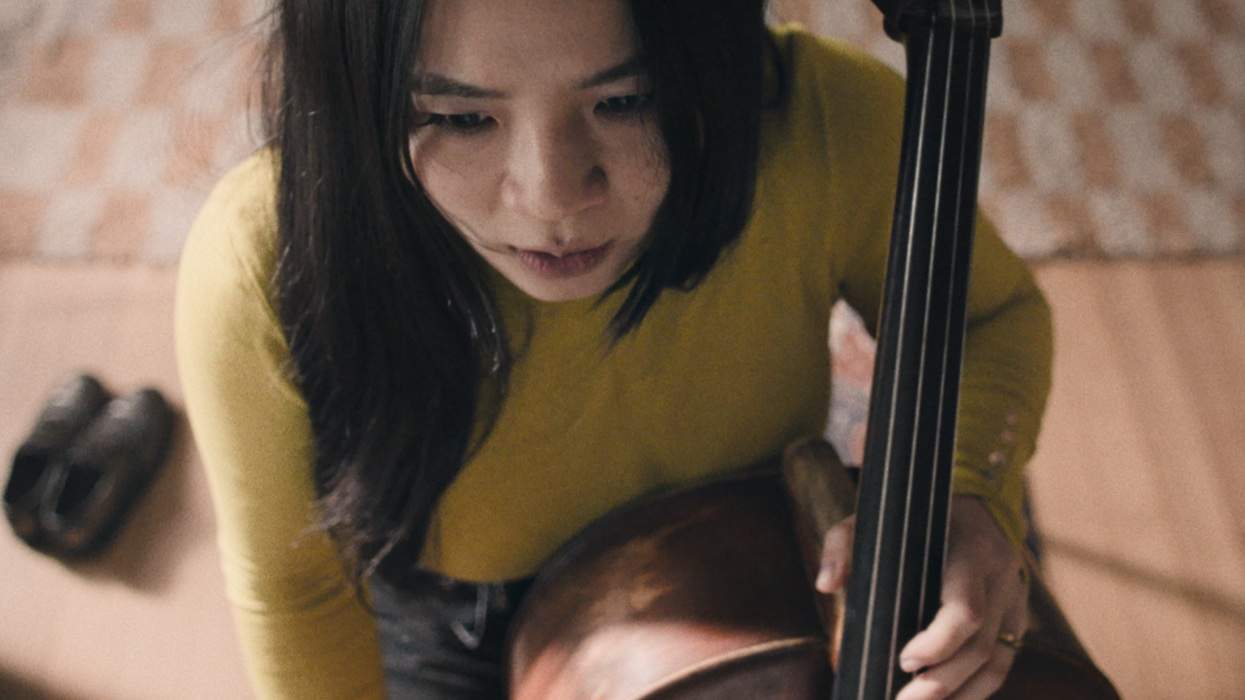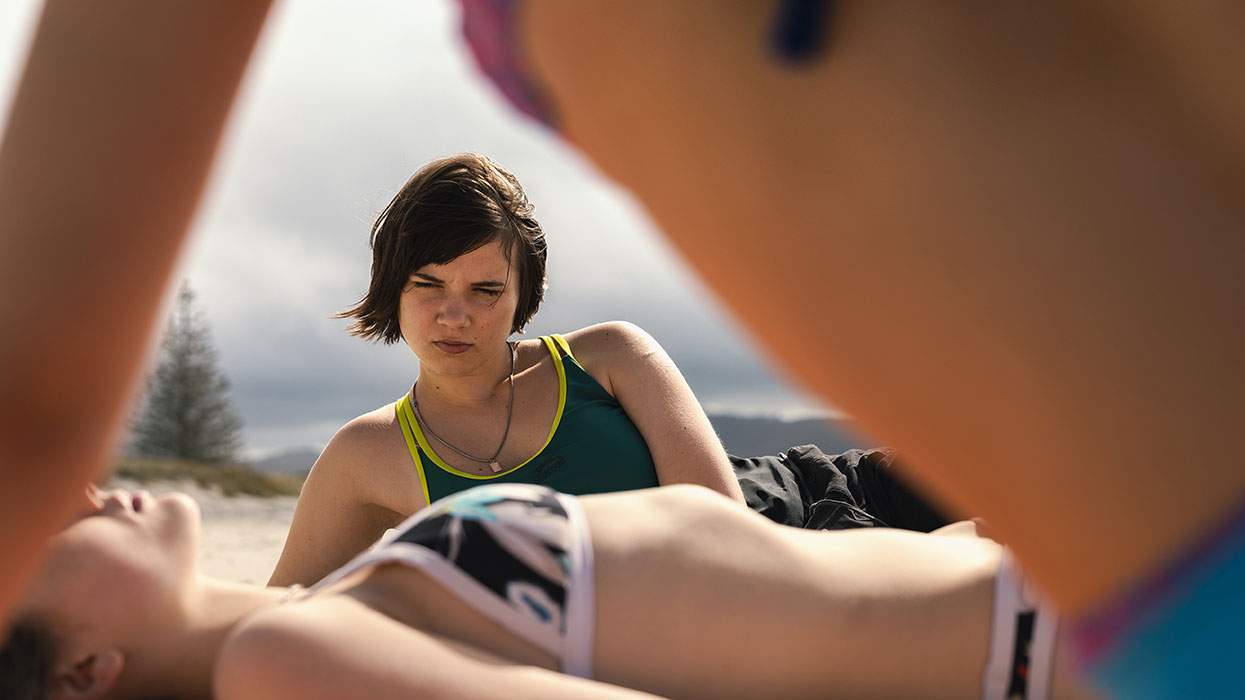On the latest episode of The Advocates podcast, the show dedicated to LGBTQ issues across generations, host Tracy E. Gilchrist is joined by pop culture junkie Kimberly Eaton and The Advocate's social media editor, Daniel Reynolds, to talk about the best LGBTQ film and television of 2018.
For hot topics, Tracy and Kimberly are joined by The Advocate's digital editorial director, Neal Broverman, to break down the recent Kevin Hart controversy, and discuss which women from SNL should have their own show.
Tracy E. Gilchrist with guest host Kimberly Eaton
Read highlights from the interview here, or listen to the full podcast interview on the audio player below.
Tracy E. Gilchrist: It's the end of the year already, if we can believe that! Also, it's been a really, in my opinion, great year for LGBTQ cinema and for television. We have been tracking the number of LGBTQ films that were released in theaters this year and we're up to almost 40. Those go from prestige films to small documentaries that were maybe released in a couple of theaters, but still released. So the question that we want to start with is, Was 2018 the best year in LGBTQ cinema ever?
Daniel Reynolds: Well, I think in terms of quantity, absolutely. I don't know if the best LGBTQ film ever made was released this year, but I mean, just in terms as you said, we had mainstream movies like Love, Simon that came out, which is groundbreaking to see a gay teen's coming-out story in theaters as well as the indie darlings like Disobedience.
Tracy: Is that indie? I guess it was.
Kimberly Eaton: I'm not familiar with that movie (kidding).
Tracy: Excuse me. We saw it together.
Kimberly: You did an excellent job of ...
Tracy: Containing myself?
Kimberly: Yes, of not spoiling it and not squirming around in your seat while I was sitting next to you. I was really impressed with your level of restraint. I was.
Tracy: We also had Colette, which I know, Kimberly, you loved.
Kimberly: I need to see that again. I'm shocked that I didn't see it multiple times that week. I've only seen it the once and I need to get back into that.
Daniel: It was one of my favorite films this year.
Tracy: It was so queer.
Daniel: So queer. And these are real people as well. We should say, like this is a real queer pioneer who is finally getting the spotlight.
Kimberly: A good century ago.
Tracy: This movie is wonderful, because on top of Colette being this groundbreaking bisexual writer, who has this affair with someone who would today be considered trans masculine probably, also, there were trans actors who played cisgender in the movie.
------
Daniel: Before we move on, I just wanted to say I also interviewed Lucas Hedges this year.
Tracy: That's right, from Boy Erased.
Daniel: And he discussed that while he still identifies as straight, he opened up about having attraction toward men in his past. Another interesting sort of lead of the male side of conversion therapy that we saw this year in theaters.
Tracy: Right. Also, what an interesting development in the way that he identifies.
Daniel: It was something along the lines of like because he hadn't struggled in his life, he didn't feel like he could call himself a part of the LGBTQ community, so he still considers himself an ally, but we're having so many great conversations in Hollywood about identity and what it means to be a queer actor and the labels that we take because there's still a lot of discrimination, unfortunately, in casting.
Tracy: What were some of your favorite queer films of the year?
Kimberly: The Favourite is my favorite and I've been telling everyone. I've been telling everyone.
Tracy: I didn't know this, and I'm grinning like the Cheshire Cat, because it makes me so happy!
Kimberly: You're a bad influence. You're a great influence. It is just so unique. First of all, I really enjoy Yorgos's [Lanthimos] storytelling, but just the content, the actors, Olivia Colman -- I live and breathe for her these days. Rachel Weisz, I know, we talked about. I loved the cinematography, I loved the wit, the love triangle, and the tugging back and forth.
Tracy: The kink, the costumes.
Kimberly: Like you said, it was very ribald and set in the early 18th century. It can still feel very modern in terms of you're like, Oh, there were moments where I was blushing.
Tracy: "Rub my leg" is a new euphemism for lesbian sex.
Daniel: Hashtag.
Tracy: I'm gonna use it.
Daniel: Just to connect it to Colette, there's another story from history where we're seeing queer people return to the pages, which is, I think, just wonderful.
------
Tracy: Let's move on to television. What were some of your favorite queer portrayals on television this year?
Daniel: I really loved A Very English Scandal. Also, going back to history, this is a real-life scenario in which a British MP has an affair with a man. There's a blackmail situation and they go to court over it. It's all very scandalous.
Kimberly: I know it's been a few months now, I still have to go back to probably Killing Eve. I was like, That, what was it? It was only eight episodes? I felt personally attacked by it only being eight episodes long. In terms of that world that was created and it just being so witty and clever. Phoebe Waller-Bridge just ... her writing. And the performances! Like I mentioned earlier, one way or the other I am going to get justice for Jodie Comer in this role. I'm just like, No Globes, no Emmys? What's happening? Sandra Oh 100 percent earned these nods that she has, and I'm really excited that she's going to host. That will be fun.
Tracy: We should talk about our shared love of The Bold Type. It came back for a second season on Freeform and there is a couple. Kat, played by Aisha Dee, she's one of the leads of the show. She's biracial, bisexual, and then there's Adena, who is her love interest who is played by Nikohl Boosheri, and she is a lesbian Muslim. Sure, it's a second season, but they had this groundbreaking conversation about sex in the second episode of the season that I actually wrote an entire piece about because I'd never heard anything so frank. I had never heard such an honest discussion about sex between women ever. I mean, sure, there was the whole L Word and they would talk about sex, but not in a way that was honest, about getting what you want.
Kimberly: Coming from this place of the dynamic of the two characters --one being this out and proud Muslim lesbian, this woman who's sort of had a number of years to be aware of herself, who she is. She is very self-assured. Then you have this younger character who is very new to these feelings that she has, doesn't quite know how to make sense of them in the first season. I would say kind of shies away from them but at the same time is a very determined person, so willing to see them through and ultimately get to a point where she knows who she is. It's really interesting seeing the dynamic between those two and then how, ultimately, how they consummate.
Tracy: We would be remiss not to mention two shows in particular. One is Pose, because it's benchmark with the largest cast of trans people ever and it, again, this is another piece of pop culture that goes back and looks at HIV/AIDS, which I felt I was being gaslit for years. I lived through it. I knew people who had it, I knew people who passed. For years nobody talked about it. It just wasn't in pop culture, like it never happened. So I'm really grateful for these portrayals of HIV/AIDS this year, because it's a recent history that I think too many people, young LGBTQ queer people, don't really know much about.
Kimberly: I think it's really interesting to place it in the context of conversations that we're having right now, say. for example with the passing of George Bush Sr., H.W. And a lot of people's concerns of how do you honestly regard someone's life, such a public figure, and attempt to reconcile their humanity with things that they did wrong? Namely ignoring this crisis. So now it's really important that we have shows like this. This is revolutionary programming, like Pose. I'm so glad that this show exists. I just want to nurture it and make sure that it's around for a long time, because I think when we have moments like this, it's as if to say "We're never going back and you're not gonna be allowed to sweep this under the rug."
Daniel: Of course, the AIDS crisis is not over. Particularly for queer people, people of color, the HIV rates are so much higher than the general population. What Pose is unafraid to do is it takes you into the clinic and it has the conversations and you just don't see any other shows doing things like that.
Tracy: Was there anything else you wanted to say about TV this year, Daniel?
Daniel: I just want to give a shout-out to Atypical. It's not a show that you would expect to be like, Oh, a queer TV show, but there were some developments that happened this season regarding one of the central characters. She was on a journey of exploration and really, if you step to look back at it, this is a show created by a woman, Robia Rashid. It has a lot of women and people of color, the staff, the writers' room, it's about autism and it incorporates autistic characters and it really shows the world.
Listen to the full podcast below for more discussion about the year in LGBTQ pop culture from Bohemian Rhapsody to Black Lightning and Vida.
The Advocates podcast is a biweekly series from the world's most influential LGBTQ magazine, where host Tracy E. Gilchrist breaks down the biggest stories in queer news, along with numerous LGBTQ guests. Don't miss a single episode by subscribing on iTunes, Soundcloud, or Google Play.


